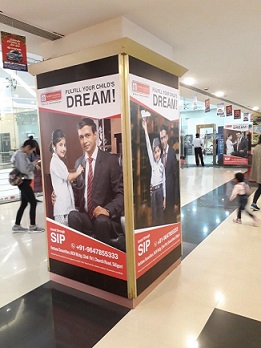How do you acquire clients in a new city where you know no one? How do you build trust among investors who have burnt their fingers in toxic financial products?
We take you through the fascinating journey of Prabin Agarwal who spent money on advertising in newspapers, billboards, cable TV, multiplexes and educated investors through newspaper articles to create a brand recall for himself in Siliguri, West Bengal.
Setback
Prabin Agarwal grew up in a small town called Rajganj near the Bangladesh-India border. He completed his graduation in Kolkata. Subsequently, he pursued Chartered Accountancy but dropped out after two unsuccessful attempts. Prabin realised that accountancy is not his cup of tea. But he didn’t lose hope.
He didn’t go back to his hometown because he had big dreams. Prabin was inclined towards market. In fact, he used to buy stocks from his pocket money.
Entrepreneurial plunge
At the age of 25, he opened a sub-broking franchise in Siliguri in 2005. Prabin realised that in trading business either the client makes money or the broker. (Broker makes money when clients trade. If clients trade frequently, they don’t get the benefit of investing long term.)
The eureka moment
Prabin had the license to sell mutual funds but he never deep-dived into it until the market crash of 2008. In July 2008, he attended a product presentation on SIP organised by an asset management firm. This was his eureka moment. He realised that the concept of systematic investing is a win-win for both investors and distributors. Mutual fund advisory didn’t require him to constantly coax clients to trade.
Rejection
Prabin hit the ground running to promote the concept of SIPs in Siliguri. However, his effort did not yield the desired result as not many investors knew him. Also, chit funds were a prominent saving vehicle for people in Siliguri. Prabin realised that while people liked the product, there was a trust deficit towards agents canvassing financial products. Thus, Prabin faced a lot of rejections. But he didn’t give up.
Building trust
This set him thinking about how he could bridge this trust deficit. Prabin observed that people believed in printed words, especially newspapers. He started placing classified advertisements in newspapers at regular intervals. This cost him Rs 3,500 per insertion. While Prabin started getting a few inquiries but it was nothing exceptional. So Prabin approached the newspaper to get his articles on personal finance and investments published in the newspaper. The articles did not have his photo. After a few articles, they started publishing his photo along with the article. This gave him some visibility and recognition among the people of Siliguri.
Educational articles and advertisements started giving him business. Encouraged by this success, Prabin started publishing bigger advertisements in newspapers. After a point of time, new business started stagnating. Prabin figured that he was reaching the same audience by advertising in the same newspaper. So he experimented by giving ads in other newspapers to reach a different audience. The strategy worked.

Prabin got convinced that his investments are getting a good return on investment, or ROI. Incidentally, one of Prabin’s clients had started a new business of outdoor advertising. The client nudged Prabin to give him some business. Out of courtesy, Prabin ran a billboard advertisement at the insistence of the client. He didn’t expect much, but it turned out to be a blessing in disguise. People started recognising him and business increased. So Prabin continued the billboard campaign.

Be creative
“A lot of people tried to replicate my model by advertising, but it didn’t work for them. Simply advertising does not get you clients. You must be creative. I spend a good amount of my daily time in conceptualising the advertisements. They must be unique and go with the current mood of the people. You have to observe what is happening around you and create a theme for your advertisement. For instance, I have done a few video advertisements based on a cricket theme during the Indian Premier League season. These commercials were aired on the local cable channel,” says Prabin.
Adapt to change
With the digital wave, television viewing transitioned from cable to set-top boxes. Many people in Siliguri started switching to set-top boxes. Slowly, cable channels became passé. Due to the prohibitive cost of advertising in mainstream channels, Prabin switched to YouTube and social media.
Prabin observed the younger generation frequented multiplexes to watch movies. So he also advertised inside the premises of Inox theatre in Siliguri.

Advertising is not the be-all and end-all
Prabin says that advertisement does 80% of the job and the adviser has to do the remaining 20%. “People will still want to meet you offline and understand further. They give business only when they are convinced.” To make his point, he shares the analogy of shaving. “The shaving foam helps in shaving but you still need a blade.”
Prabin spends around 15 % to 20 % of his gross revenues in advertisements. He currently manages assets worth Rs 150 crore in mutual funds. Interestingly, 80% of his total assets consists of SIP AUM. His SIP book is worth Rs 2 crore per month and he serves a client base of 2,000 families. A majority of his clients are from Siliguri.
Success mantra
Prabin scripted his success in a place where he had no contacts, no friends or family members. He just had a vision and the perseverance to try new things despite repetitive failures. His story tells us that we can achieve anything if we believe in ourselves and keep experimenting. Also, like any other business, advisers need to invest in their business to grow. One can’t depend on market recovery, good economic prospects, earnings recovery or a favorable tax environment for your business to pick up. You need to work towards your goals, irrespective of the external environment.